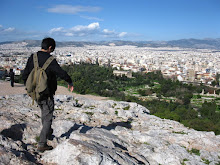While reading the chapters on the Vietnam War in Henry Kissinger's Diplomacy for my history class earlier, I was struck by these 2 sections:
"Unlike democratic theory, which views truth as emerging from a clash of ideas, Confucianism maintains that truth is objective and can only be discerned by assiduous study and education of which only a rare few are thought to be capable. Its quest for truth does not treat conflicting ideas as having equal merit, the way democratic theory does. Since there is only one truth, that which is not true can have no standing or be enhanced through competition. Confucianism is essentially hierarchical and elitist, emphasizing loyalty to family, institutions, and authority."
"In the West, political pluralism had thrived among cohesive societies where a strong social consensus had been in place long enough to permit tolerance for the opposition without threatening the survival of the state. But where a nation has yet to be created, opposition may appear as a threat to national existence, especially when there is no civil society to provide a safety net. In these conditions, the temptation is strong, often overwhelming, to equate opposition with treason."
Now, Kissinger was talking about Vietnam or Indochina in the 1950s in these sections. But, which other Southeast Asian state could he have be referring to just as well? Gee...I wonder...
Singapore's political situation in the 60s was hardly as precarious as that of Vietnam, but still, as a newly-independent state, wary of both Malaysia and Communist influences, and with Confucian values as its foundation, one can see how and why the PAP government was able to successfully engineer a siege mentality in the populace which gave it legitimacy to crush opposition under the name of national security. The problem perhaps is that the trope of the nation under siege has been used time and time again such that we have been conditioned to dismiss the merits of having a strong opposition. Obviously though, this is just a breakwater that will not stand the waves of time. Civil society is developing in Singapore. The number of local political blogs and the alternative viewpoints they offer are testaments to that. So, then, it all comes down to a clash between democratic theory and Confucianism? Maybe there is legitimacy to both forms of government-running. Singapore's economic success is prove that the latter works, I suppose. The question is: Which one serves the state, and which one serves the people?
Tuesday, April 7, 2009
Subscribe to:
Post Comments (Atom)


No comments:
Post a Comment